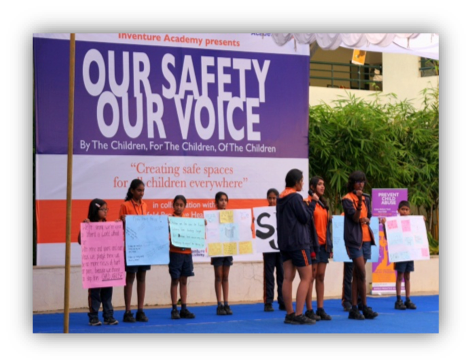250 children of 12 to 18yrs were gathered at the venue. Both girls and boys from diverse socio-economic background. They represented International schools to Central Board, State Board to NGO run bridge school for mainstreaming child labour. While some wore school uniforms, others were in casual daily wear. A few children with physical disabilities & challenges were also present! Heated conversation in English, Hindi or Kannada.
Uniting all of them was the one TOPIC OF DISCUSSION – OUR VOICE OUR SAFETY!
It was an exhilarating experience for India Literacy Project and 4 other Bangalore based NGOs (Enfold Proactive Health Trust, APSA, Concerned for Working Children and CRT) in facilitating the children’s workshop in collaboration with Inventure Academy. Over 250 children gathered at the Inventure School premises to participate in the consultation regarding ‘How to Make Schools Safe – The Karnataka State Policy for Child Protection and Implementing Guidelines and Operational Procedures for Educational Institutions’.
There were many interesting recommendations that emerged from the deliberations and were included in the Children’s Charter. These recommendations have also been incorporated in the Karnataka State Child Protection Policy that was notified by the Karnataka State Cabinet in April 2016, and a few key ones are:
- A zero tolerance policy must be implemented in all schools for protection of children from bullying and sexual abuse.
- A ‘Suggestion Box’ must be placed in all schools to regularly enable children to share their opinions as well as express their grievances. This Suggestion Box is to be placed in or near the toilet areas, as these are the only places where children have privacy.
- CCTV cameras must not be placed in class rooms as it invades the privacy of the students. However, all stakeholders – teaching and non-teaching staff, management, parents and students – must be enabled to be the ‘protecting eye’, preventing children from any form of abuse and safety negligence or violations.
- Senior student representatives must be included as mandatory members of every school’s Child Protection Committee (with the number of representatives proportionate to the school strength). The student representatives must also be present when the Suggestion Box is regularly opened and follow-up action discussed.
Children today are recognised as ‘subjects of rights’ and not mere ‘objects of protection’ where most decisions are made by adults without understanding children’s perspective. Consequently, a lot of emphasis is now being placed on providing platforms for children to voice their concerns and their perceptions of safety, and express their views, opinions and suggestions on how they can actively participate to make schools and homes safer for themselves.
India Literacy Project upholds the UN Convention on the Rights of Children, 1989 and ensures that all its partners provide the space for children in schools, community and with governments to express their views and perspectives, whatever be the matter at hand. Through formation of Meena Manch/Thanda, Child Rights Clubs/Sanghas, Children’s Cabinets and other such platforms, children are oriented on their rights and responsibilities and how they can be part of initiatives on matters that affect their lives.
The collective efforts of NGOs and children’s forums across the state has resulted in the Karnataka Government passing an order for exclusively taking up children’s issues through the Makkala Grama Sabhas, wherein children are also represented. Other State governments are gradually recognizing the role being played by children as ambassadors for preventing violence against them, improving access to facilities like functional toilets, public transport in rural areas, road safety in urban centers, etc.
Children have also actively contributed their might to influence election manifestos of contending state parties, spurred by the staunch belief that who forms the government does not matter but what does is their commitment for children!
